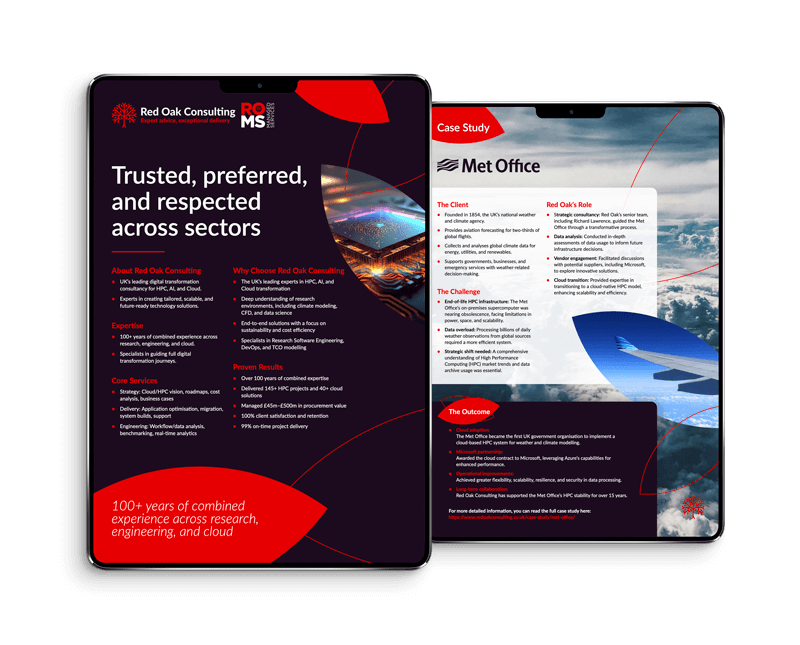How High-Performance Computing is Revolutionising Meteorology
At Red Oak Consulting, we have witnessed firsthand the transformative impact of High-Performance Computing (HPC) on various industries.
Perhaps nowhere is this impact more profound and far-reaching than in the field of meteorology.
In this blog post, we’ll explore how HPC is revolutionising weather forecasting and climate research, with real-world examples from leading meteorological organisations like the UK Met Office.
The Perfect Storm: Why Meteorology Needs HPC
Meteorology is a field that deals with vast amounts of data and complex mathematical models.
 The Earth’s atmosphere is a chaotic system, and predicting its behaviour requires immense computational power.
The Earth’s atmosphere is a chaotic system, and predicting its behaviour requires immense computational power.
This is where HPC comes into play, offering the following key advantages:
- Processing Power: HPC systems can perform trillions of calculations per second, allowing for more detailed and accurate weather models.
- Data Handling: Weather forecasting relies on processing enormous datasets from satellites, weather stations, and other sources. HPC systems can handle these massive data volumes efficiently.
- Model Resolution: With HPC, meteorologists can create higher-resolution models that capture finer details of atmospheric processes.
- Ensemble Forecasting: HPC enables running multiple forecast scenarios simultaneously, improving the reliability of predictions.
Examples of HPC in Action:
1. The UK Met Office: Pushing the Boundaries of Weather Forecasting
 The UK Met Office is a world leader in weather and climate prediction, largely thanks to its investment in HPC.
The UK Met Office is a world leader in weather and climate prediction, largely thanks to its investment in HPC.
In 2020, the Met Office announced a £1.2 billion investment in a state-of-the-art supercomputer, expected to be the world’s most advanced, dedicated to weather and climate.
Key features of the Met Office’s HPC system include:
- Processing power of 60 petaflops, making it one of the world’s fastest supercomputers
- Ability to process 215 billion weather observations per day
- Capacity to run more than 100 climate model simulations simultaneously
This computational power allows the Met Office to:
- Provide more accurate forecasts for specific locations
- Improve the reliability of forecasts up to two weeks ahead
- Better predict extreme weather events, potentially saving lives and reducing economic losses
2. ECMWF: Harnessing HPC for Global Weather Predictions
The European Centre for Medium-Range Weather Forecasts (ECMWF) is another prime example of HPC’s impact on meteorology.
Their supercomputer, one of the largest dedicated to weather forecasting, enables them to produce global weather forecasts up to 15 days ahead.
ECMWF’s HPC capabilities allow them to:
- Run their Integrated Forecasting System (IFS) model at a horizontal resolution of 9 km globally
- Produce ensemble forecasts with 51 members, providing probabilistic predictions
- Process and assimilate over 800 million observations per day into their forecasting model
3. The Cloud Revolution: HPC Meets Cloud Computing
While traditional on-premises HPC systems continue to play a crucial role in meteorology, the advent of Cloud computing is opening up new possibilities. Cloud-based HPC solutions offer several advantages:
Scalability: Cloud resources can be scaled up or down based on demand, allowing for more efficient resource utilisation.
Accessibility: Cloud-based HPC makes advanced computing power accessible to smaller organisations and researchers who may not have the resources for on-premises systems.
Collaboration: Cloud platforms facilitate easier data sharing and collaboration among researchers worldwide.
Cost-effectiveness: Pay-as-you-go models can be more cost-effective for organisations with variable computing needs.
4. NOAA’s Big Data Program: Democratising Weather Data

The National Oceanic and Atmospheric Administration (NOAA) in the United States has embraced Cloud computing through its Big Data Program.
This initiative makes NOAA’s vast weather and climate data freely available on major Cloud platforms, including Amazon Web Services, Google Cloud, and Microsoft Azure.
Benefits of this approach include:
- Improved accessibility of weather data for researchers and businesses
- Reduced costs for NOAA in data distribution and storage
- Encouragement of innovation in weather-related applications and services
The Future of HPC in Meteorology
As we look to the future, several exciting developments are on the horizon:
Exascale Computing
The next frontier in HPC is exascale computing, systems capable of performing a quintillion (10^18) calculations per second. These systems will enable:
- Even higher-resolution global climate models
- More accurate long-term climate projections
- Better understanding of complex atmospheric phenomena
AI and Machine Learning Integration
The integration of artificial intelligence (AI) and machine learning (ML) with HPC is set to revolutionise weather forecasting further:
- Better parameterisation of sub-grid scale processes
- More efficient post-processing of model outputs
- Digital Twins of the Earth
Ambitious projects like Destination Earth (DestinE) aim to create a digital twin of the Earth, leveraging HPC and Cloud computing to simulate the planet’s climate system with unprecedented detail.
Challenges and Considerations
While the benefits of HPC in meteorology are clear, there are challenges to consider:
Energy Consumption: HPC systems require significant amounts of energy. The meteorological community is actively working on developing more energy-efficient systems and practices.
Data Management: As the volume of weather and climate data grows exponentially, effective data management becomes crucial.
Skill Gap: There’s a growing need for professionals who understand both meteorology and HPC technologies.
Balancing Accuracy and Timeliness: While more detailed models can provide more accurate forecasts, they also take longer to run. Striking the right balance is crucial for operational forecasting.
Conclusion: Clearing the Skies with HPC

High-Performance Computing has fundamentally transformed the field of meteorology, enabling more accurate weather forecasts and deeper insights into our changing climate.
From the UK Met Office’s supercomputer to NOAA’s Cloud-based Big Data Program, HPC is helping meteorologists around the world to better understand and predict atmospheric phenomena.
As we face the challenges of climate change and increasingly extreme weather events, the role of HPC in meteorology will only grow in importance.
By harnessing the power of supercomputers and Cloud computing, we’re not just predicting the weather – we’re gaining the tools we need to navigate the storms ahead, both literal and metaphorical.
At Red Oak Consulting, we’re excited to be part of this technological revolution, helping organisations leverage HPC and Cloud computing to push the boundaries of what’s possible in meteorology and beyond.
As we look to the future, one thing is clear: in the world of weather forecasting, HPC is the wind beneath our wings, propelling us towards ever greater heights of accuracy and understanding.

Tez Gale
Senior Consultant
Red Oak Consulting


